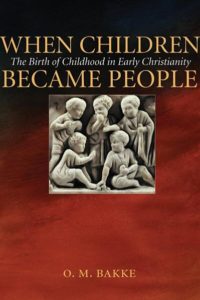Book Note: When Children Became People
January 26, 2016by Mark Garcia
O. M. Bakke, When Children Became People: The Birth of Childhood in Early Christianity, trans. by Brian McNeil (Minneapolis: Fortress Press, 2005).
What is a child, and what is a child for? What qualities identify a child as such? Are they desirable or undesirable? Is a child an image of folly or of innocence, of weakness or of strength? An old Greek adage said, “Old men are like children once more.” In our day we might think that endearing, and an image of innocent simplicity may come to mind. In the ancient world, however, the adage reflected the connection of children with ignorance.
In eight chapters, O. M. Bakke explores the development from this ancient, negative model of childhood to the more familiar positive one, and he identifies the emergence of Christianity as the difference maker. He correctly identifies his topic as a largely neglected theme in theological disciplines: the nature and value of childhood. New Testament studies — especially studies of children as models of the Kingdom in the Gospels — is the exception in the literature (3). Bakke investigates each of the main topics in his field, all of which are familiar to those who read in this area: the nature and qualities of a child according to Greco-Roman philosophical traditions; children in pagan antiquity; patristic teaching; and abortion, infanticide, expositio, and sexual relations between adults and children. Bakke then adds a few interesting studies of the upbringing and education of children, children in worship, and the challenge posed to ancient models of religious perfection by the need to care well for children.
There is much in Bakke’s book that is easily found elsewhere, yet his investigation of Christian commitments over against prevailing Greco-Roman sentiment is frequently insightful. Every page contains interesting information and merits patient pondering, especially for those reading Bakke as an introduction to the question. Still, several reviewers have raised legitimate concerns about Bakke’s handling of his material. Passages from the church fathers (and the range is impressive) are quoted frequently but they are disrobed of context, both the contexts of the writings themselves and of the larger development of doctrine. This is a notable weakness. Invariably, when an author fails to note contextual features of a quoted passage, the reader happily supplies his own. In this case the weakness could potentially rob the author’s argument and the patristic writer of due force. Further, scholarly literature is ably summarized and the standard terrain of the topic is well covered, but Bakke does not account for the scholarly conversations to which his secondary sources belong nor the conversations which were generated by those publications.
But these oversights are fairly banal compared to another, namely Bakke’s understanding of what qualifies as the principal context for the New Testament and early Christian writers. Bakke appropriately details the Greco-Roman intellectual, legal, and family environments which were subverted by the characteristically high Christian views of childhood. However, while Bakke aims to offer a partly theological justification for Christian perspectives on children, this amounts to little more than appeal to statements by early Christians, and the conceptual critiques at work between Christian and pagan sources are investigated too thinly. Most importantly, the principal resource for very early Christian conviction regarding children – the Scriptures of the Old Testament – does not figure meaningfully in Bakke’s account. This is a deeply regrettable lacuna in an otherwise stimulating and frequently compelling portrait of early Christian thinking…
Continue reading at The Quarry.
Next Post...
The Bread of Life
January 15, 2016by Vern Poythress






